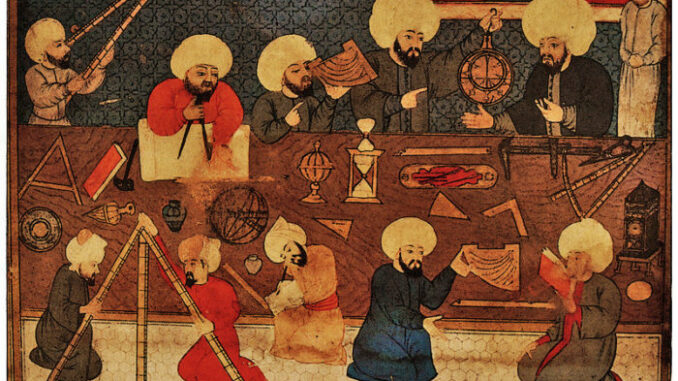OPINION: Islamic Science and Scientists
by Arshia Malik
In the 1980s, Kalam joined the Indian Ballistic Missile Development Program, where he played a leading role in the development of the Agni and Prithvi missiles.
For some people it is difficult to think of Islamic science or that there could be of could have been Muslim scientists. In fact, Islamic science refers to the scientific knowledge and discoveries made by scholars and scientists in the Islamic world, which stretched from Spain and North Africa in the west to India and Central Asia in the east, from the 8th to the 16th centuries. During this time, Islamic scholars made significant contributions in fields such as mathematics, astronomy, medicine, chemistry, and optics. Islamic science has its origins in the translation and study of the works of ancient Greek, Roman, Indian, and Persian scientists. The Islamic empire, which was established in the 7th century, encountered a wide range of cultures and civilizations, including those of Greece, Egypt, and Iran. This contact led to the translation of many scientific texts into Arabic. These translations, known as the “Translation Movement,” played a crucial role in the development of Islamic science.
One of the most important figures in the early days of Islamic science was Al-Khwarizmi, a Persian mathematician and astronomer who lived in the 9th century. He is considered the father of algebra and his book, “Al-Kitab al-mukhtasar fi hisab al-jabr wa’l-muqabala,” which means “The Compendious Book on Calculation by Completion and Balancing,” introduced the concept of algebra to the Islamic world. He also wrote a book on astronomy called “Zij al-Sindhind” which was later translated into Latin and had a significant impact on medieval European astronomy. Another notable figure in Islamic science is Ibn Sina latinised (Avicenna), a Persian polymath who lived in the 11th century. He is considered one of the most important figures in the history of medicine and his book “The Canon of Medicine” was used as a medical textbook in the Islamic world and Europe for centuries. He also made contributions to the fields of logic, metaphysics, and psychology. Al-Razi, a Persian physician and alchemist who lived in the 9th century, also made significant contributions to the field of medicine. He is considered one of the greatest clinicians of his time and his book “Kitab al-Hawi” is a comprehensive medical encyclopaedia that was widely used in the Islamic world and Europe.
Islamic scholars also made important contributions to the field of astronomy. One of the most notable figures in this field is Al-Battani, an Arab astronomer and mathematician who lived in the 9th century. He made several accurate astronomical observations and his book “Kitab az-Zij” was widely used in the Islamic world and Europe. Islamic scholars also made significant contributions to the field of optics. The Persian scientist Al-Kindi, who lived in the 9th century, wrote a book on optics called “Kitab al-Manazir” which discussed the nature of light, the formation of images, and the properties of mirrors. The book was later translated into Latin and had a significant impact on medieval European optics. In addition to these notable figures, there were many other Islamic scholars who made important contributions to the fields of science. They built upon the knowledge of the ancient world and made new discoveries and advancements. They also established institutions such as libraries and observatories to further the study of science. The impact of Islamic science on the world was significant. The knowledge and discoveries made by Islamic scholars were translated into other languages and spread to Europe, where they played a crucial role in the development of science in the Middle Ages. The work of Islamic scientists also influenced the work of European scientists during the Renaissance.
The Indian subcontinent too has been fortunate enough to produce two great scientists, despite the tragedy of the Partition of India which cleaved the region into East and West Pakistan, one of them eventually separating further into the country of Bangladesh. Pakistan, despite its handicaps of terrorism, narrow-visioned leaders, official policy of religious fanaticism and poor human rights record can boast of Pervez Hoodbhoy, a nuclear physicist and educationist who has been an advocate for the promotion of science education in Pakistan. He is a professor of physics at the Forman Christian College in Lahore, and a regular commentator on science and education-related issues in his country. He has been critical of the state of science education in Pakistan and has argued that the country has not been able to fully benefit from its scientific and technological capabilities due to a lack of investment in education and research.
Hoodbhoy has also been a vocal critic of the role of religious extremism in Pakistan and its impact on the country’s education system. He has argued that religious fundamentalism in Pakistan has led to the suppression of critical thinking and the spread of pseudoscience. He has also been critical of the role of the Pakistani military in the country’s political and educational affairs.
Hoodbhoy is also a prominent advocate for the peaceful uses of nuclear technology. He has written extensively on the subject and has been a vocal critic of the nuclear arms race in South Asia, calling for the de-escalation of tensions between Pakistan and India. Professor Hoodbhoy’s work has been recognized with several awards and honors, including the Right Livelihood Award, also known as the “Alternative Nobel Prize” in 2013. He has also been honoured with the Abdus Salam Prize for Mathematics and the UNESCO Kalinga Prize for the Popularization of Science.
The mother of Pakistan, India (Bharat) hasn’t stopped producing sons and daughters of calibre amongst whom, APJ Abdul Kalam, is a favourite role model and icon across all sections of the subcontinent and its neighbours. Dr Kalam was an Indian scientist and politician who served as the 11th President of India from 2002 to 2007. He is also known as the “Missile Man of India” for his work on the development of India’s missile program. Kalam was born in a small village in the southern state of Tamil Nadu, India. He studied physics and aerospace engineering and began his career as a scientist at the Defence Research and Development Organisation (DRDO) and the Indian Space Research Organisation (ISRO). He played a key role in the development of India’s first satellite launch vehicle, SLV-3, and the successful launch of Rohini, the first satellite to be placed in orbit by an Indian-made launch vehicle.
In the 1980s, Kalam joined the Indian Ballistic Missile Development Program, where he played a leading role in the development of the Agni and Prithvi missiles. He was appointed as the chief executive of the Integrated Guided Missile Development Program and is credited with the successful development of the short-range surface-to-surface missile, the Prithvi, and the intermediate-range ballistic missile, the Agni. In addition to his work in the field of missile technology, Kalam made significant contributions to the field of aerospace engineering. He was the project director of India’s first indigenous Satellite Launch Vehicle (SLV-3) and played a key role in the development of the Polar Satellite Launch Vehicle (PSLV) and the Geosynchronous Satellite Launch (GSLV). Kalam also played a key role in India’s civilian space program and was the architect of the Indian satellite-based remote sensing program. He was also the chief executive of the Indian Remote Sensing satellite program and played a key role in the development of the IRS series of satellites.
After leaving the DRDO and ISRO, Kalam served as the Chancellor of the Indian Institute of Space Science and Technology and as a professor of aerospace engineering at Anna University in Chennai. He also worked as a visiting professor at several universities in India and abroad. In 2002, Kalam was elected as the President of India, becoming the first scientist and the first bachelor to hold the office. During his tenure as President, he focused on the development of science and technology and the promotion of education, particularly in rural areas. Kalam passed away on July 27, 2015, while giving a lecture at the Indian Institute of Management in Shillong, Meghalaya. He was widely mourned in India and was honoured with a state funeral. He is remembered as one of India’s most talented scientists and a visionary leader who made significant contributions to the development of India’s missile and aerospace programs.
Both countries could do well to adopt these two eminent personalities of Muslim heritage who have brought laurels to their respective countries as role models for the future generations. Just as the two shared Nobel Prize Winners of Peace, Kailash Satyarthi, and Malala Yousufzai, together leading the strayed masses towards education, progress, prosperity, and tolerance, in their respective countries while dispelling the fallacies that there can be no Muslim scientists or there is no Islamic science.
Arshia Malik is a Delhi-based writer, blogger and social commentator with focus on women issues and conflicts in societies with a particular focus on South Asia. She makes her living as a school teacher and is an avid collector of literature. Her fields of interests are education, minority and child rights, secularism and tolerant attitude in a fast developing world.
Disclaimer: Views expressed by writers in this section are their own and do not reflect Milli Chronicle’s point-of-view.



